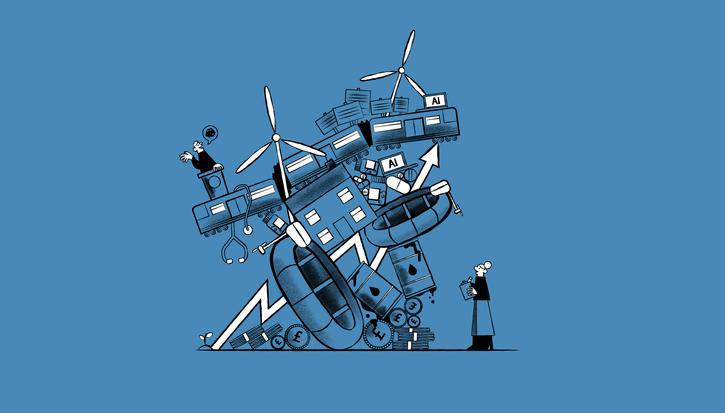Who will power the powerhouse? The energy sector’s challenges and opportunities in the North
Article
As the UK plots its path towards a low-carbon economy, energy policy has reached something of a crossroads. The choices that government, business and ordinary citizens take about the generation, supply and use of power and heat will determine whether we can fulfil the commitments made in the Paris agreement on climate change, and whether our energy system becomes a challenge we struggle to cope with or an opportunity we are ready to seize.
Nowhere is this more true than in the north of England, where historically the energy sector has not only supplied the whole nation with significant quantities of heat and light, but has also been a major contributor to the labour market and the health of the wider economy. By virtue of its historical natural abundance of coal, the North became home to major centres of power and heat generation, and a wide range of energy-intensive industries that have clustered around them. But its future role in ‘keeping the lights on and our homes warm’ is now open for question.
Analysis
Challenges
The northern energy sector faces three significant challenges.
- A decline in the traditional energy economy: Traditional power generation is already in decline, with coal-fired power stations due to be phased out by 2025 and many combined cycle gas turbines reaching the end of their working lives. In economic terms, the North’s share of energy GVA has fallen from a third to less than a quarter since 1997.
- High energy demand: Energy demand is disproportionately high in the North due to the presence of several energy-intensive commercial and industrial sectors. This means that energy supply is critical to the wider health of the economy, but also that demand projections show little scope for significant reductions in the demand for gas or power between now and 2030.
- A reliance on national policy: The North’s ability to exploit the potential sites for power generation is potentially vulnerable given its reliance on a national energy policy and direction of travel, which may obscure regional opportunities and key strengths.
Opportunities
The fact that the north of England is facing such major challenges makes very little sense because – while it is vulnerable, given its legacy of coal generation – it is not without a range of other geographical, geological and historical advantages that make it well positioned to reassert its role as the powerhouse of the nation. There are two primary opportunities for the energy sector in the North.
- The North has the geological, geographic and historical assets to power and heat the nation. The North is leading the way in the transition to a renewable power supply, with nearly half of all renewable power generated in the north of England and extensive scope to scale-up offshore wind and develop tidal schemes. The North is also home to an extensive nuclear capability, and biomass energy generation represents another short- to mid-term option for cleaner generation. As regards heat, the North has the attributes and natural advantages to lead in the take-up of new approaches, infrastructure and resources that will underpin a sustainable, low-carbon pattern of heat supply for the nation. There exists the potential to convert significant parts of the gas network to run on hydrogen, which can be stored in the North’s extensive system of salt caverns. There is scope for harnessing waste heat from significant industrial clusters in sophisticated district heating systems and, although controversial, there are significant amounts of shale gas across the Bowland-Hodder Basin which could be exploited through fracking.
- The North has the low-carbon economy and assets needed to deliver new sources of generation. The North has the ability to lead the way with its burgeoning low-carbon goods and services sector, in which levels of employment are well above national averages. In part this is due to the significance of important local assets, unique to each local enterprise partnership area, but it is also a result of significant investment in new energy technologies and their development. Alongside its world-renowned expertise in the renewable industry, the North has pockets of innovation in critical areas such as energy storage and demand management. With many of these specialisms linked to other ‘prime economic capabilities’ in which the North has world-leading strengths, such as in advanced manufacturing and data processing, there is no good reason why the northern energy sector shouldn’t become a key plank of a place-based industrial strategy.
So the country sits at an energy intersection, where the North is exposed to the risk of being held back by the lack of strategic thinking at an appropriate spatial scale to mitigate the challenges ahead and to maximise the clear opportunities and a reliance on national policy. The failure to exploit these assets would not just be of detriment to the North but also the nation. It could represent a major missed opportunity to develop secure, low-carbon and abundant power and heat. The North has the potential to help the UK meet its greenhouse gas emission reduction targets and position itself as a leader in the innovation and technologies that are necessary to deliver generation in a low-carbon energy system.
Key questions for further analysis
The energy system, like many aspects of transport infrastructure, is one area in which a pan-northern approach is likely to yield significant advantages. To this end, the northern energy taskforce, whose remit is to explore and develop a high-level Northern Energy Strategy, will build upon this initial landscape analysis by exploring a series of further questions.
- How far do current demand projections reflect the level of ambition required both to provide energy security at a reasonable cost to the North’s businesses and consumers while at the same time putting the nation on track to meet its climate change commitments?
- How much can each of the significant opportunities in the North – both in terms of power and heat – contribute towards the nation’s transition to a low-carbon economy and reduce its dependency on energy imports?
- How can we make sure that place-based industrial strategy maximises opportunities for the north of England to continue to drive the energy sector in the UK and build on its comparative advantages in order to maximise its leading role in energy systems innovation on a global stage?
- What aspects of energy policy are best addressed by national government, and by local players such as local enterprise partnerships? To what extent is there value and scope in devolving certain powers and strategic responsibilities to a pan-northern level of co-ordination?
Related items

Bridge to the future: how to get the NHS through the winter and ready for reform
NHS staff across the country are gritting their teeth. Christmas parties have come and gone, but a more threatening annual tradition looms once again – the NHS ‘winter crisis’. This period, renowned for long waits and increased mortality,…
The great enabler: transport’s role in tackling environmental crises and delivering progressive change
In this special issue of IPPR Progressive Review we bring together leading political, academic and civil society thinkers to consider transport in modern Britain and its role in delivering a healthier, greener, more prosperous and…
The shape of devolution
How do we create transparent, fair and practical footprints for local power across England?